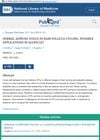Adipose-Derived Stem Cells and Their Secretory Factors for Skin Aging and Hair Loss
January 2015
in “
Springer eBooks
”

TLDR Fat-derived stem cells and their secretions show promise for treating skin aging and hair loss.
The 2015 document outlines the therapeutic potential of adipose-derived stem cells (ADSCs) and their secretory factors for skin aging and hair loss. ADSCs, obtained from liposuction, can differentiate into various cell types and release cytokines and growth factors aiding tissue regeneration. They have shown promise in wound healing, anti-wrinkle, and antimelanogenic effects for skin treatments. ADSC protein extracts promote hair growth by influencing follicular cell cycles and protecting against androgens and oxidative stress. The document reports that ADSCs increase keratinocyte proliferation and migration, exhibit antioxidant properties, enhance collagen production, and decrease melanin synthesis, which could be beneficial for skin whitening and UVB protection. A large-scale pilot study with 235 participants aged 28-71 years showed improvements in skin texture and wrinkles after ADSC protein extract treatment. For hair loss, ADSC-conditioned media (ADSC-CM) activated crucial signaling pathways for dermal papilla cell survival and proliferation, increased hair shaft elongation, and induced the anagen phase. Observational pilot studies with 27 female and 25 male patients with pattern hair loss showed significant increases in hair density and thickness after 12 weeks of ADSC protein extract treatment, with no severe adverse reactions. A split-scalp study in 6 male patients also demonstrated increased hair count on the ADSC-treated side. The document concludes that ADSCs and their secretory factors are promising for skin and hair regeneration, with potential for large-scale manufacturing and stability, offering advantages over cell-based therapies.








